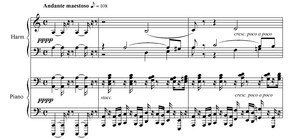Petite messe solennelle
| Petite messe solennelle | |
|---|---|
| Mass by Gioachino Rossini | |

|
|
| Form | Missa solemnis |
| Text | |
| Language | Latin |
| Dedication | Louise, Countess of Pillet-Will |
| Performed | 14 March 1864 Paris |
| Movements | 14 |
| Vocal |
|
| Instrumental |
|
| Petite messe solennelle | |
|---|---|
| Orchestral version | |
| Performed | 28 February 1869 by Théâtre-Italien, Paris |
| Vocal |
|
| Instrumental | Orchestra |
Gioachino Rossini's Petite messe solennelle (Little solemn mass) was written in 1863, possibly at the request of Count Alexis Pillet-Will for his wife Louise to whom it is dedicated. The composer, who had retired from composing operas more than 30 years before, described it as "the last of my péchés de vieillesse" (sins of old age).
The extended work is a missa solemnis, but Rossini labeled it, not without irony, petite (little). He scored it originally for twelve singers, four of them soloists, two pianos and harmonium. The mass was first performed on 14 March 1864 at the couple's new home in Paris. Rossini later produced an orchestra version, including an additional movement, a setting of the hymn "O salutaris Hostia" as a soprano aria. This version of the mass was not performed during his lifetime because he could not obtain permission to perform it with female singers in a church. It was first performed three months after his death, at the Salle Ventadour in Paris by the company of the Théâtre-Italien on 24 February 1869.
While publications began that year, the first critical edition appeared only in 1980, followed by more editions in 1992, the bicentenary of the composer's birth.
Rossini composed the Petite messe solennelle in 1863, 34 years after his last opera, in Passy, where he spent the last decades of his life. Rossini and his wife entertained a circle of friends, holding samedi soirs for which he composed several pieces of chamber music, often vocal, which the composer called his péchés de vieillesse (sins of old age). The mass was possibly commissioned by Count Alexis Pillet-Will for his wife Louise to whom it is dedicated, but the musicologist Nancy P. Fleming points out that Rossini may have had reasons of his own to compose it, and dedicated it in response to staging the first performance.
The mass is structured in several extended movements in the tradition of the missa solemnis, but the composer labeled it petite with a grain of irony. He wrote on the last page of the manuscript:
...
Wikipedia
